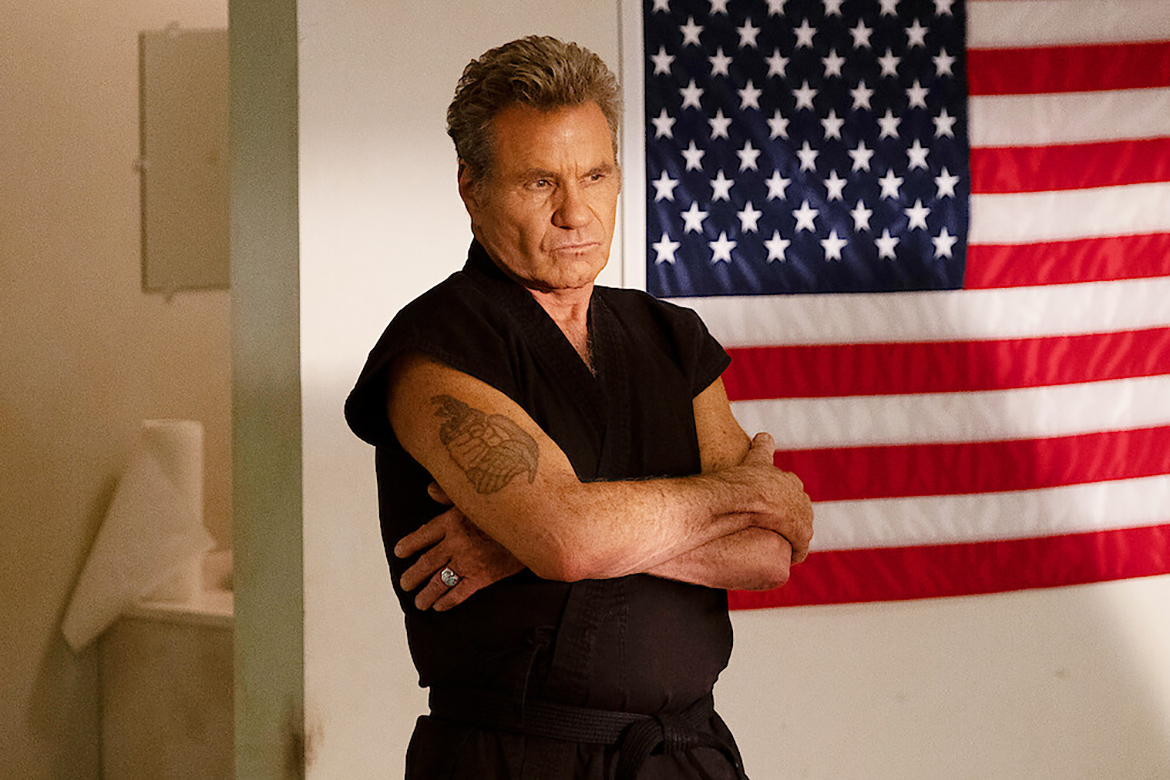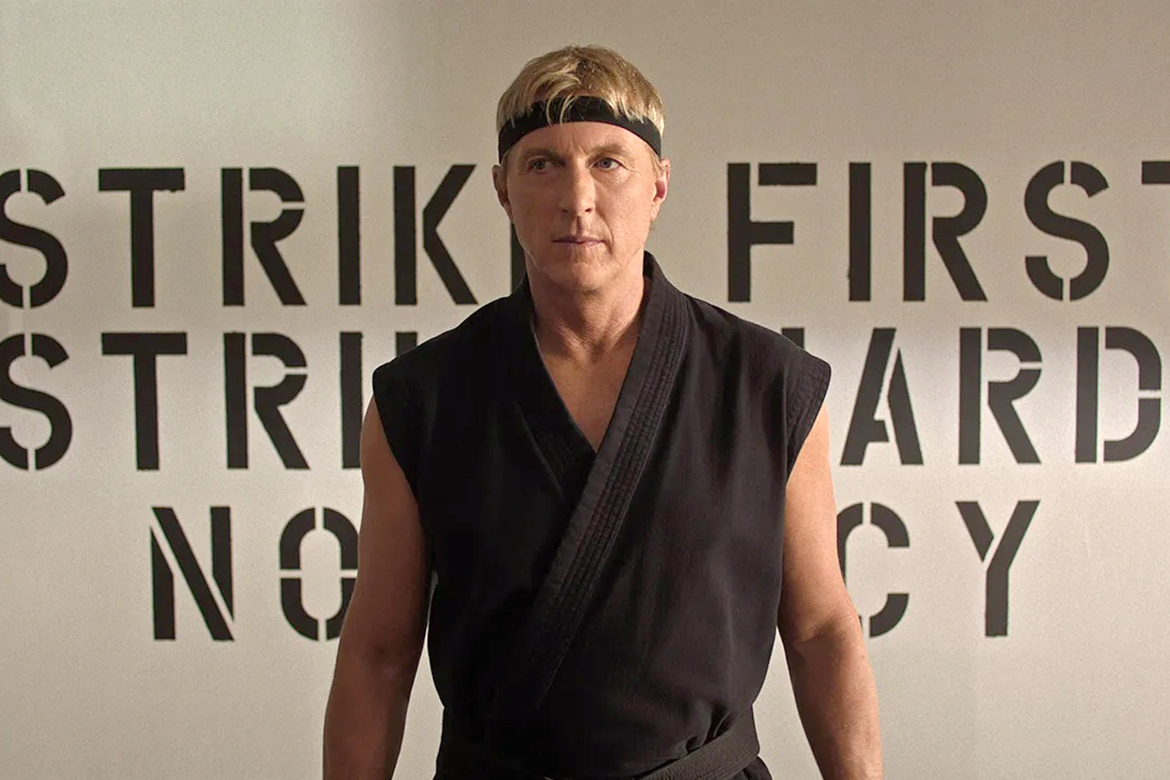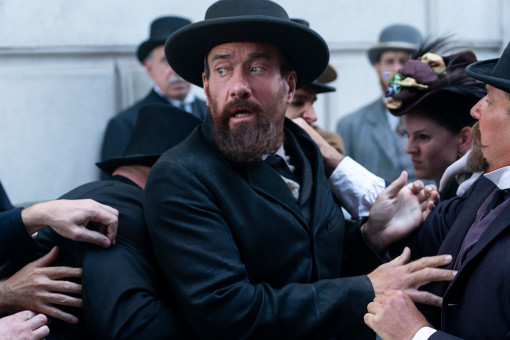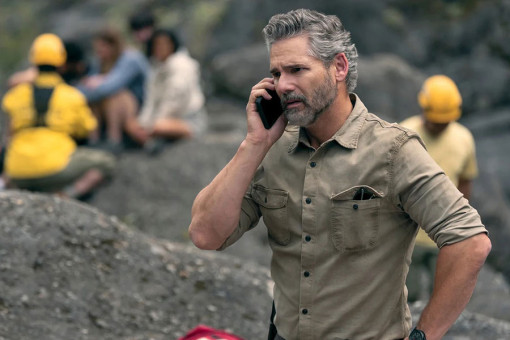There are two kinds of pop-culture nerds: Those who instantly understand the context behind “Strike first, strike hard, no mercy” and those who just don’t.
Josh Heald, Jon Hurwitz and Hayden Schlossberg bet on the former when they were creating Cobra Kai in 2017. In fact, the proud Gen X filmmakers (Hot Tub Time Machine) knew a rabid fanbase would clamor for a follow-up series to The Karate Kid franchise that proudly honored the saga’s characters, storylines and references — including the motto of that antagonizing titular dojo.
"This may sound naïve, but the expectations were high," Hurwitz recalls. "We just had this vision for something that was going to connect with people who love The Karate Kid and make a younger audience fall in love as well. So we had a lot of confidence."
Or, as Heald puts it, "We knew it was going to be huge. The audience got it right."
Nope, it doesn’t take a master sensei to realize that Cobra Kai — which recently dropped its final five episodes of season six on Netflix — will go down as one of the most successful movie-to-TV spinoffs ever. The series thrived from a YouTube-to-Netflix migration in 2020. It garnered nine Emmy nominations, including a 2021 nod for Outstanding Comedy Series. And, whoa, it turned classic 1980s high-school bully Johnny Lawrence (William Zabka) into a gruff-if-likable family man who counts Daniel LaRusso himself (Ralph Macchio) among his closest allies. “One of the amazing benefits of the show is that we have this 40-year history,” Schlossberg says. "There's a rooting interest in them being friends even though they’re still polar opposites. We love it when they bicker, but they're as close as they've ever been."
The last hurrah revolves around a re-do of the original film's prestigious Sekai Taikai karate tournament, in which Cobra Kai members Tory (Peyton List) and Miguel (Xolo Mariduena) compete against the dojo of Sensei Wolf (Lewis Tan). But in a climactic twist, Lawrence himself must show off his moves. Evil pony-tailed magnate Terry Silver (Thomas Ian Griffith) is in control of the purse strings, and cigar-chomping wild card John Kreese (Martin Kove) just can’t resist stirring up trouble. "The goal," says Heald, "is to bring a conclusion and resolution to everything we have put in motion."
Heald, Hurwitz and Schlossberg, who also worked on the show as executive producers, writers and directors, wax on for The Television Academy. Just one warning: When it comes to talking plot details, we too abide by the “no mercy” approach. Spoilers ahead!!!
Television Academy: What did you hope to accomplish in these last five episodes?
Josh Heald: We walked into season six with probably more characters on screen than any other half hour television show, and certainly more action. So there were so many relationships that had left to be resolved, either from last season or throughout the six seasons or from 40 years ago — and we needed to make sure that all of those storylines and relationships had not only a believable and satisfying resolution, but fulfilled the goals of what we set out to do seven or eight years ago. We just put a bow on everything that we've been heading toward this whole time.

Why did you have to kill off Kreese?
Hayden Schlossberg: We never see the dead body!
Heald: Don’t let him gaslight you!
Schlossberg: All I'm saying is this is a guy who has faked his death in the past, but I will grant you, yes, it looks unlikely. So we really felt that Kreese needed to make a huge sacrifice in that Darth Vader sort of way to get the audience's forgiveness. But it had to be in Kreese's own wild, crazy way. The idea of a final fight on a yacht with a huge explosion showed the height of how far we're willing to go. Now that last episode could really be a more internal Johnny story and less about the villains taking over and ruling the world.
So let's talk about Johnny. Why is this ultimately his story?
Jon Hurwitz: The show is called Cobra Kai. We already had three movies in the 1980s that were the Daniel LaRusso story and his growth. But this is about Johnny’s redemption. We saw a man in the first episode who had given up on life and was basically a recluse with no future. Now, through his relationship with Daniel, he’s opened up a dojo, has a relationship with his students and given a second chance. And then at the end, he does have that final victory.
William Zabka isn’t a teen anymore, obviously. How much fighting did he really do in that physically demanding climactic match against Lewis Tan?
Heald: I would say 98 percent of it. Billy is a black belt. He went through martial arts training for The Karate Kid, and he kept on that journey throughout his life. When we brought back this franchise, Billy got himself back in the gym and has been in constant training. So the camera is not doing any trickery, except when he falls hard because he might break something. I'll say that out of everybody, Billy is the most judgmental of his own choreography and martial arts work on the screen. He doesn't want to use the stunt double march onto the mat.

Who did you really want to bring back in that finale but couldn't?
Hurwitz: We were bummed about Chad McQueen, who played [Cobra Kai member] Dutch [in The Karate Kid]. He's somebody who we talked about bringing onto the show from the very beginning, and for a number of years, he was hesitant to come back because he had had some racing accidents, hadn't acted in a long time and felt uncomfortable performing. But he loves Billy so much and saw how successful the show was, and his kids loved the show. He was like, "You know what? I’ll do it."
Right before filming this final season, we all traveled out and visited with him. He was actually supposed to be in that final episode. But unfortunately, he was not able to make it because of his health at that time. [McQueen died in September 2024, at age 63, of organ failure].
So what’s next? Are you involved in the new Karate Kid movie that comes out this summer?
Heald: The movie is from a separate arm of Sony and doesn’t overlap with our wheelhouse. But I don't think we'll ever have closure with this franchise — because we just love it so much — and we don't want to close the door. So this is the end of the mothership.
But we have so much energy and love for this franchise in this universe, and all of these characters, that we have a lot of ideas about where we can take this story in another iteration. That’s going to be up to a series of discussions between us and our partners at Sony and Netflix. But we feel like the franchise has never been more vibrant.
This interview has been condensed and edited for length and clarity.
Every season of Cobra Kai is now streaming on Netflix.












